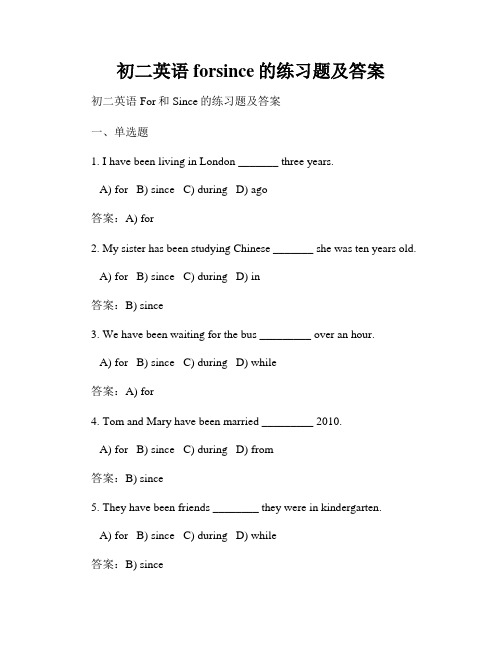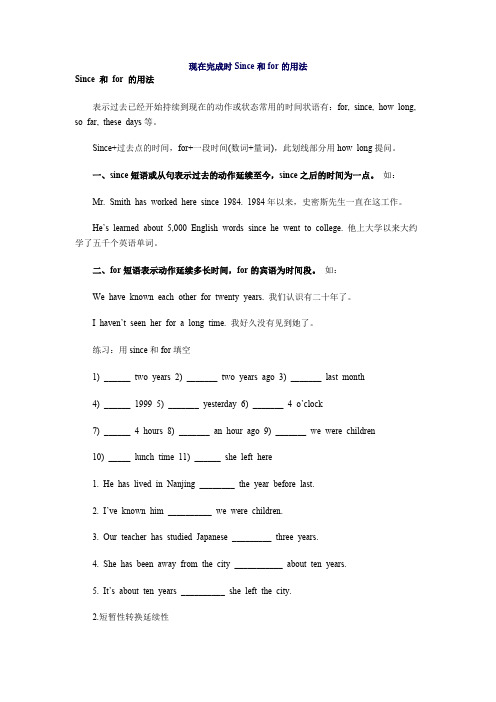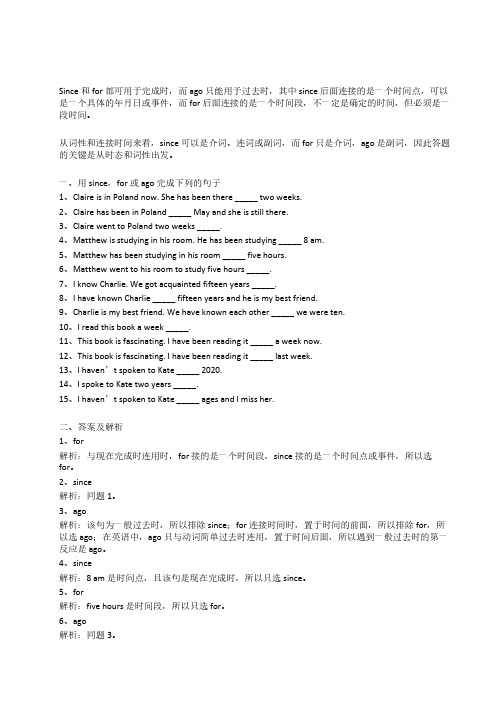for和since区别练习题
初二英语forsince的练习题及答案

初二英语forsince的练习题及答案初二英语For和Since的练习题及答案一、单选题1. I have been living in London _______ three years.A) for B) since C) during D) ago答案:A) for2. My sister has been studying Chinese _______ she was ten years old.A) for B) since C) during D) in答案:B) since3. We have been waiting for the bus _________ over an hour.A) for B) since C) during D) while答案:A) for4. Tom and Mary have been married _________ 2010.A) for B) since C) during D) from答案:B) since5. They have been friends ________ they were in kindergarten.A) for B) since C) during D) while答案:B) since二、填空题1. I have been learning French ______ four months.答案:for2. She has been working as a nurse ______ five years.答案:for3. They have been living in New York _______ 2012.答案:since4. We have been waiting here ______ half an hour.答案:for5 We have been friends ________ our childhood.答案:since三、改错题将句子中错误的部分划出并修改。
现在完成时Since和for的用法

现在完成时Since和for的用法Since 和for 的用法 表示过去已经开始持续到现在的动作或状态常用的时间状语有:for, since, how long, so far, these days等。
Since+过去点的时间,for+一段时间(数词+量词),此划线部分用how long提问。
一、since短语或从句表示过去的动作延续至今,since之后的时间为一点。
如: Mr. Smith has worked here since 1984. 1984年以来,史密斯先生一直在这工作。
He’s learned about 5,000 English words since he went to college. 他上大学以来大约学了五千个英语单词。
二、for短语表示动作延续多长时间,for的宾语为时间段。
如: We have known each other for twenty years. 我们认识有二十年了。
I haven’t seen her for a long time. 我好久没有见到她了。
练习:用since和for填空 1) ______ two years 2) _______ two years ago 3) _______ last month 4) ______ 1999 5) _______ yesterday 6) _______ 4 o’clock 7) ______ 4 hours 8) _______ an hour ago 9) _______ we were children 10) _____ lunch time 11) ______ she left here 1. He has lived in Nanjing ________ the year before last. 2. I’ve known him __________ we were children. 3. Our teacher has studied Japanese _________ three years. 4. She has been away from the city ___________ about ten years. 5. It’s about ten years __________ she left the city. 2.短暂性转换延续性 ①arrive at/in sw. get to/reach sw. come/go/move to sw. →be in sw./at school/at home/on the farm/be here/be there 1) He got to Beijing five minutes ago. He ________ _________ _________ Beijing for _________ _________. 2) I moved to the USA last year. I ________ ________ __________ the USA since __________ __________. 3) I went home yesterday. I _______ ________ _________ home for _________ __________. 4) They came here last week. They _________ _________ here since _________ __________. ②come/go back, return →be back come/go out →be out 1) He came out two years ago. He _________ __________ _________ for __________ __________. 2) We return to Fuzhou yesterday. We ________ ________ _________ to Fuzhou since __________. ③become →be 1) I became a teacher in 2000. I ________ __________ a teacher for _________ _________. 2) The river became dirty last year. The river _________ _________ dirty for _________ __________. ④close →be closed open →be open 1) The shop closed two hours ago. The shop ________ _________ _________ for _________ _________. 2) The door opened at six in the morning. The door ________ ________ ________ for six hours. ⑤get up →be up die →be dead leave sw. →be away from sw. fall asleep/get tot sleep →be asleep finish/end →be over marry →be married 1) I got up two hours ago. I ________ ________ ________ since ________ ________. 2) He left Fuzhou just now. He _______ ________ ________ _________ Fuzhou for five minutes. 3) My grandpa died in 2002. My grandpa _______ _______ ________for _______ ________. 4) The meeting finished at six. The meeting ________ ______ ______ for six hours. 5) I got to sleep two hours ago. I ________ _________ _________ since _________ __________. 6) They married in 1990. They ________ _________ __________since _________. ⑥start/begin to do sth. →do sth. begin →be on 1) I began to teach at this school in 1995. I ____ ____ at this school since ____. 2) The film began two minutes ago. The film ____ ____ ____ for ____ ____. ⑦borrow →keep lose →not have buy →have put on →wear catch/get a cold →have a cold get to know →know 1) They borrowed it last week. They _________ _________ it since __________ __________. 2) I bought a pen two hours ago. I _________ _________ a pen for ________ __________. 3) I got to know him last year. I _________ __________ him since __________ __________. 4) I put on my glasses three years ago. I __________ __________ my glasses for _________ _________. ⑧have/has gone to →have been in 1) He has gone to Beijing. He ____ ____ _____ Beijing for two days. ⑨join the league/the Party/the army →be a league/a Party member/a soldier →be a member of the league/the Party →be in the league/the Party/the army 1) He joined the league in 2002. He ________ _________ a _________ _________ for two years. He ________ __________ a __________ ___________ the __________ for two years. He ____________ ___________ ___________ the league for two years. 2) My brother joined the army two years ago. My brother __________ __________ a ___________ for ___________ ___________. My brother ___________ ___________ in ____________ ___________ for two years. 3.汉译英 1)这本字典我已买了三年了。
现在完成时讲解及练习题(含答案)[1]
![现在完成时讲解及练习题(含答案)[1]](https://img.taocdn.com/s3/m/0132335bfd0a79563d1e72d7.png)
现在完成时讲解及练习题(含答案)(word版可编辑修改)编辑整理:尊敬的读者朋友们:这里是精品文档编辑中心,本文档内容是由我和我的同事精心编辑整理后发布的,发布之前我们对文中内容进行仔细校对,但是难免会有疏漏的地方,但是任然希望(现在完成时讲解及练习题(含答案)(word版可编辑修改))的内容能够给您的工作和学习带来便利。
同时也真诚的希望收到您的建议和反馈,这将是我们进步的源泉,前进的动力。
本文可编辑可修改,如果觉得对您有帮助请收藏以便随时查阅,最后祝您生活愉快业绩进步,以下为现在完成时讲解及练习题(含答案)(word版可编辑修改)的全部内容。
时态讲解:现在完成时(1)构成:现在完成时由助动词have + 过去分词构成,助动词have 有人称和数的变化.第三人称单数用has,其余用have.现在完成时的否定式直接在助动词后面加上not、疑问式是把助动词提到主语之前。
以study 为例,其否定式、疑问式和简单回答形式如下:(2)用法:1)现在完成时通常表示在说话之前已经完成的动作或存在的状态。
说话人强调的是该动作或状态对现在的结果或影响.My daughter has just gone out. 我女儿刚出去。
I’m sure we’ve met before。
我肯定我们以前见过面。
She has arrived。
她到了。
2)表示持续到现在的动作或状态,往往和包括现在在内的表示一段时间的状语连用,如recently, already, just, lately,for…, since…,yet等。
如:I haven’t heard from her these days。
这些日子我没有收到她的信。
We haven’tseen you recently。
最近我们没有见到你。
They have been away for two years。
他们离开已经两年了。
She has been withus since Monday。
since的用法总结

since的用法总结以下是小编为大家整理的since的用法总结,希望可以帮助到你们提高英语水平!since释义prep.从…以来; 自从…之后; 自从;adv.以后,此后; 后来; (距今几年)以前; (从那时候起几年)以前conj.自从…以来; 自从…的时候起; 既然; 因为since的用法一.Since作为介词后接某一确定的时间点,主句谓语动词是持续性动词,常与现在完成时态、现在完成进行时态或过去完成时态连用。
例如:1.He left the village in 1982 and I haven’t seen him since then.1982年他离开这个村子,从那以后我再没见过他。
2.She’s been working in a bank since leaving school.她中学毕业后就一直在一家银行工作。
3.He had spoken to her only once since the party. 自从那次聚会以来,他只跟她说过一次话。
二.Since作为副词表示从过去以来、以后或到现在的情形或状态,常与现在完成时态连用。
例如:1.He left home two weeks ago and we haven’t heard from him since. 他两周前离开了家,到现在我们一直没有他的消息。
2.He came to Zhenjiang 6 years ago and has lived here (ever) since.他6年前来到镇江,从此便住在这里。
三.since引导原因状语从句作为连词,since可引导原因状语从句,表示因为;既然;鉴于:例如:1.He didn’t come since he was busy.他因为忙,所以没有来。
2.Since this method doesn’t work,let’s try anoter.既然这种方法不行,我们就试用另一种吧。
2021小升初英语总复习第九讲介词知识点讲解+练习

第九讲:介词一、【考点解读】介词是一种用来表示词与词、词与句之间的关系的虚词,在句子中不能单独作成分。
介词后面一般有名词代词或相当于名词的其他词类,短语或从句作它的宾语。
介词和它的宾语构成介词词组,在句中作状语、表语、补语或介词宾语。
介词可以分为时间介词、地点介词、方式介词、原因介词和其他介词。
介词是英语中最活跃的词类之一,特别是一些常用介词的搭配力特别强,可以用来表示各种不同的意思。
二、【知识讲解】Mrs. Smith’s kitchenMrs. Smith’s kitchen is small.There is a refrigerator in the kitchen.The refrigerator is white.It is on the right.There is an electric cooker in the kitchen.The cooker is blue.It is on the left.There is a table in the middle of the room.There is a bottle on the table.The bottle is empty.There is a cup on the table, too.The cup is clean.知识点1——时间介词at, on, in 的用法1. at(1)表示具体时刻,如:at three o’clock在三点钟at half past eight在八点半(2)固定搭配:at noon at night at dawn at duskat the moment at first at the beginning at presentat last at sunrise at sunset at the age ofat the same time at dinner-time at the end of at Christmas2. on(1)表示具体某一天(包括节假日),如:on March 8th, 2016在2016年3月8日on Children’s Day在儿童节(at the Spring Festival)on Sunday在星期天(2)表示具体某一天的早、中、晚,如:on Saturday morning在周六早上on a rainy evening在一个下雨的傍晚on a hot afternoon在一个炎热的下午3. in(1)表示月份,季节,年,年代,世纪,如:in July在七月in summer在夏天in 2016 在2016年in the 1990s在20世纪90年代in the 21st century在21世纪in his twenties在他20多岁(2)后面跟一段时间,表示“…..之后”,指将来的时间,如:in a week 一周之后in a few months 几个月之后I’ll be back in a few minutes. 我几分钟后回来。
一般过去时态和现在完成时态的区别练习题

一般过去时态和现在完成时态的区别练习题1)一般过去时态表示过去某时发生的动作或单纯叙述过去的事情,强调动作;现在完成时态中动作为过去发生的,强调过去的事情对现在的影响,强调的是影响。
如:I saw this film yesterday. (强调看的动作发生过了)I have already seen this film.(强调对现在的影响,电影的内容已经知了)I haven’t finished my work yet. (强调对现在的影响,还有工作要做,不能去玩) When did you finish your homework? (询问过去的动作所发生的时间,与现在无关)2)一般过去时态表示动作在过去已经停止;现在完成时态表示过去开始的动作一直延续到现在。
如:Ann visited her uncle last weekend.(visit这个动作在过去已经停止) They have lived here since 1983.(live here 这个动作从1983年开始,一直延续到现在)3)一般过去时态常用非延续性动词,如borrow, buy, come, go, leave, start, die, finish, become等。
现在完成时态可表示持续到现在的动作或状态,与时间段连用时动词一般是延续性的,如keep, have, live, teach, learn, work, study, know, be等。
如:He joined the League three years ago .(join是短暂动词)He has been in the League for three years.(be in表状态,在团内的状态可延续)He has been a League member for three years. (是团员的状态可延续)4)一般过去时态常与具体的时间状语连用,而现在完成时态通常与模糊的时间状语连用,或无时间状语。
for since because as 选择题

for since because as 选择题在英语中,for、since、because和as都可以用来表示原因或理由,但在使用上存在一些区别。
下面我将为您解释它们的区别,并给出一些选择题。
for通常用于表示一个较长的时期或一系列事件的原因或理由。
通常用于说明某个动作或状态的原因或目的。
since通常用于表示某个时间点或某个事件发生后一直持续的原因或理由。
通常用于强调某个动作或状态已经发生或存在了一段时间。
because通常用于表示直接的原因或理由,强调因果关系。
通常用于回答why的问题。
as通常用于表示原因或理由,但强调的是一种伴随关系或同时发生的情况。
通常用于说明某个动作或状态发生的原因或目的。
以下是一些选择题,请根据您对每个选项的理解进行选择:We have to stay at home _____ the bad weather.A. forB. sinceC. becauseD. asI didn't go to the party _____ I was tired.A. forB. sinceC. becauseD. asI have been a teacher _____ I was a child.A. forB. sinceC. becauseD. asHe left early _____ he had to pick up his daughter from school.A. forB. sinceC. becauseD. asHe didn't come to the meeting _____ he was ill.A. forB. sinceC. becauseD. as。
since,for 和 ago 的用法区别习题(答案及解析)

Since 和 for 都可用于完成时,而 ago 只能用于过去时,其中 since 后面连接的是一个时间点,可以是一个具体的年月日或事件,而 for 后面连接的是一个时间段,不一定是确定的时间,但必须是一段时间。
从词性和连接时间来看,since 可以是介词、连词或副词,而 for 只是介词,ago 是副词,因此答题的关键是从时态和词性出发。
一、用 since,for 或 ago 完成下列的句子1、Claire is in Poland now. She has been there _____ two weeks.2、Claire has been in Poland _____ May and she is still there.3、Claire went to Poland two weeks _____.4、Matthew is studying in his room. He has been studying _____ 8 am.5、Matthew has been studying in his room _____ five hours.6、Matthew went to his room to study five hours _____.7、I know Charlie. We got acquainted fifteen years _____.8、I have known Charlie _____ fifteen years and he is my best friend.9、Charlie is my best friend. We have known each other _____ we were ten.10、I read this book a week _____.11、This book is fascinating. I have been reading it _____ a week now.12、This book is fascinating. I have been reading it _____ last week.13、I haven’t spoken to Kate _____ 2020.14、I spoke to Kate two years _____.15、I haven’t spoken to Kate _____ ages and I miss her.二、答案及解析1、for解析:与现在完成时连用时,for 接的是一个时间段,since 接的是一个时间点或事件,所以选for。
